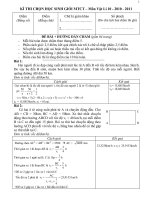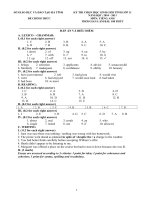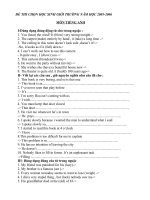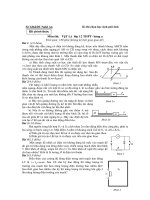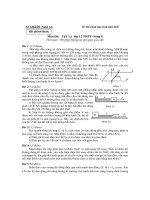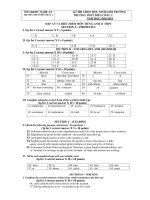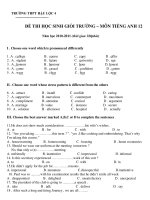- Trang chủ >>
- Đề thi >>
- Đề thi lớp 10
KÌ THI CHỌN HỌC SINH GIỎI TRƯỜNG MÔN TIẾNG ANH KHỐI 10 (14)
Bạn đang xem bản rút gọn của tài liệu. Xem và tải ngay bản đầy đủ của tài liệu tại đây (59.49 KB, 6 trang )
I. Chooses the word that has the underlined part pronounced differently:
1. a. warm b. wash c. wall d. walk
2. a. height b. weight c. vein d. eight
3. a. wood b. soon c. good d. foot
4. a. student b. huge c. communicate d. sudden
5. a. seafood b. threaten c. spread d. peasant
II. Choose the words that have different stress pattern:
6. a. cartoon b. comedy c. document d. action
7. ambitious b. delicious c. industrious d. glorious
8. a. reply b. communicate c. subtract d. practice
9. a. demonstration b. atmosphere c. documentary d. engineer
10. a. beautiful b. miraculous c. endangered d.
extraordinary
III. Supply the correct form of the word in capital.
11. She has one of the biggest …………. in Britain. COLLECT
12. They have added three new songs to the show, which……… by LONG
about fifteen minutes
13. He was very ………… of the work he had done PRIDE
14. I spend my ………… in the country. CHILD
15. I think it is very ……………… of him to expect us to work REASON
over time every night this week.
III. Put the verbs in brackets in the correct forms of the
verbs.
16. (Come)……………. into the room he (see)…………… Mary where he (leave)
……………. her.
17. The last time he (see)……………… in the public he (wear)……………… a grey suit.
18. That’s a good novel but I (not read)………………………… it before.
19. I couldn’t risk (leave)…………………… him alone.
20. Good, everybody’s ready. If we (leave)…………… now, we (miss)…………. the rush hour
traffic.
21. I (sit)…………………… there for about ten minutes, pretending to read, when someone (sit)
…………………. down at my table.
22. Their marriage only lasted three months. If he (be)…………………. less mean, she (not
leave)…………….……. him.
23. Heavy rain kept us from (go)……………………… to the class on time.
24. I (watch)………………………… the TV when you called last night.
25. I (not see)…………………… her since we (leave)……………………… school.
IV. Choose the best answer, A, B, C or D.
26. My classmate told me to watch movies in English ………. Learn spoken English better.
A. so as B. so that C. in order that D. in order to
27. I’d like to contribute …………. the school Red Cross fund.
A. on B. to C. with D. for
28. By the time you receive this letter, I ………………. for Ho Chi Minh city.
A. will leave B. will be leaving C. have left D. will have left
29. He retired early ill – health.
A. on behalf of B. on account of C. believe D. imagine
30. Amy, ……… car had broken down, was in a very bad mood.
A. who B. whom C. whose D. that
31. The librarian gave us a lot of information, ……………… was very useful.
A. this B. most of that C. which most of it D. most of which
32. Last summer, we had ………… holiday in Spain
A. a two week’s B. a two – weeks C. two – week D. a two – week
33. I felt sorry about breaking my friend’s glasses. Afterwards, I offered ……… for them.
A. pay B. to pay C. paying D. to paying
34. Nobody could hear her ………… she spoke too quietly.
A. so B. however C. although D. because
35. The Icelandic language …………. very little over the past 800 years.
A. is changing B. was changing C. has changed D. changes
36. …………., Thomas refused the water.
A. Although he was thirsty B. Despite he was thirsty
C. Though being thirsty D. Even though his thirsty
37. I’m learning English ………… English songs.
A. singing B. to singing C. to sing D. for sing
38. His old story made me …………
A. bore B. boring C. bored D. boredom
39. There will be ………… good film at ………… cinema next week.
A. a – a B. a – the C. the – a D. the – the
40. I watch an ……… film on TV last night.
A. interest B. interests C. interesting D. interested
41. It was ………… 2005 that he became an actor.
A. until that B. not when C. not until D. until when
42. The paper has ………… good news today.
A. a B. an C. the D. some
43. If you ……… to me, you wouldn’t have got so much trouble.
A. listened B. would listen C. had listened D. would have listened
44. Many sea animals are at …………. due to hunting and water pollution.
A. loss B. death C. risk D. danger.
45. Not until he was 16 …………… English.
A. that he learned B. when he learned C. did he learn D. would he learn
V. Find the mistake in each of the sentences below:
46. Ms Baker, she spent her life working with the health and welfare of the families of
A B C D
worker, is an successful woman in the world.
47. I remember to be given a toy drum on my fifth birthday.
A B C D
48. She can sing the song by both Vietnamese and English.
A B C D
49. You can l ead a horse to water b ut you can't ma k
e him d r
i n k
i n g.
A B C D
50. The breaking glass was still on the floor.
A B C D
VI. Choose the most suitable word or phrase to fill in each of the gaps in the following
passage.
E
arlier
this
morning
when
some
classmates
and
I
were
[51]
basketball in the park
near our school, it suddenly began to rain
[52]
. We immediately grabbed our
basketball and ran for shelter. At
first we
stood together under a tree [53]
then it began
to thunder.
Peter
told us that it was [54]
to stay under a tree in a rainstorm,
[55]
when there is lighting, so we ran to a nearby store to wait
[56]
the rain
stopped.
From
[57]
we were standing, we could see that the
[58]
was empty. Before
the rain had started, there had been
people
everywhere but now [59]
was playing
basketball or football or
doing
[60] or sitting on the park [61]
reading the
morning
papers or
chatting with their
friends.
We stood in the [62]
of the store for nearly twenty
minutes
before the rain
finally stopped and the sun came [63]
again
from
behind the clouds. Within a few
minutes the park was [64]
of
people
again but now the air was cooler and big [65]
of rainwater could
be
seen
everywhere.
51. A. hitting B. kicking C. playing D.
throwing
52. A. greatly B. heavily C. severely D. very
big
53. A. and B. so C. but D.
yet
54. A. danger B. in danger C. a danger D.
dangerous
55. A. specially B. especially C. mostly D.
chiefly
56. A. for B. until C. when D.
as
57. A. here B. where C. there D.
place
58. A. park B. place C. rain D.
shelter
59. A. nobody B. none C. no people D.
somebody
60. A. exercise B. nothing C. breathing. D.
jogging
61. A. chairs B. sofas C. stools D.
benches
62. A. doorway B. door C. gate D.
window
63. A. back B. up C. out D.
down
64. A. filled B. full C. crowded D.
plenty
65. A. ponds B. puddles C. reservoirs D.
springs
VI. Read the passage and choose the best answer for each of the following questions.
London is a big city, but many of the people who live there regard it as a number of small towns
put together. Each district has its own identity and atmosphere and some parts are even described
by their inhabitants as “village”. Much of the center of the city consists of shops and businesses
and the majority of people live in the suburbs. A great many of them travel to work in the city
every day by train, bus, tube or car; this is called commuting. Commuters might spend as much
as two hours every morning getting to work and another two hours getting home again. The cost
of living in London is higher than in most other parts of Britain, and many people are paid extra
money on top of their salaries because of this. Millions of visitors come to London every year
from all over the world to see the famous sights, such as Buckingham Palace, where the Queen
live, and many other historic buildings. London is famous for its theatres, red buses and black
taxis.
66. Some parts of London are regarded as ‘village’ by the:
A. visitors B. local residents C. officers D. foreigners
67. Which of the following sentences is NOT TRUE about London?
A. Most Londoners live in the city’s center.
B. In London, people travel to work by car, bus, train and tube.
C. It takes time for Londoners to go to work.
D. There are many famous places in London.
68. What does the word Commuters mean?
A. people who go to work by bus.
B. people who travel to work from their home every day.
C. people live in the suburbs.
D. those who travel to London.
69. Things in London are:
A. as expensive as other parts of Britain
B. at the same price as other parts of Britain.
C. cheaper than other parts of Britain.
D. more expensive than other parts of Britain.
70. London is famous for many things EXCEPT:
A. buses B. historical buildings C. Cinema D. taxis.
VII. Rewrite the following sentences using the following cues.
71. If she had seen him waving, she would have waved back.
She didn’t ……………………………………………………………
72. “I am leaving tomorrow,” she said, “by 4.30 from New York station”
She said ………………………………………………………………….
73. The secretary didn’t know where the meeting was. I talked to her five minutes ago.
The secretary who ……………………………………………………………………
74. I’m going horseback riding with Tom this afternoon. I’m afraid of horses.
Although …………………………………………………………………………….
75. It's about t
w o k
il o m
e t e
rs
and a ha l f from her school to the
cinema. (make questions with the
underlined words)
…………………………………………………………………………………?
VIII. Complete each sentence of the following letter.
Dear Mr. Black,
1. Thank you/ letter/ I receive/ this morning.
………………………………………………………………….
2. Thank you/ invite me/ come/ interview/ Tuesday next week.
……………………………………………………………………
3. Unfortunately/ I / not able/ attend/ time/ suggest.
……………………………………………………………………
4. Be/ possible/ rearrange/ interview/ Wednesday morning/
……………………………………………………………………
5. I/ be/ office/ 8.30/ morning.
……………………………………………………………………
6. I/ be/ most grateful/ you/ contact/ confirm/ time.
……………………………………………………………………
7. I/ look forward/ hear/ you/ and meet/ week.
……………………………………………………………………
Yours sincerely,
Thomas Dunn
The end
